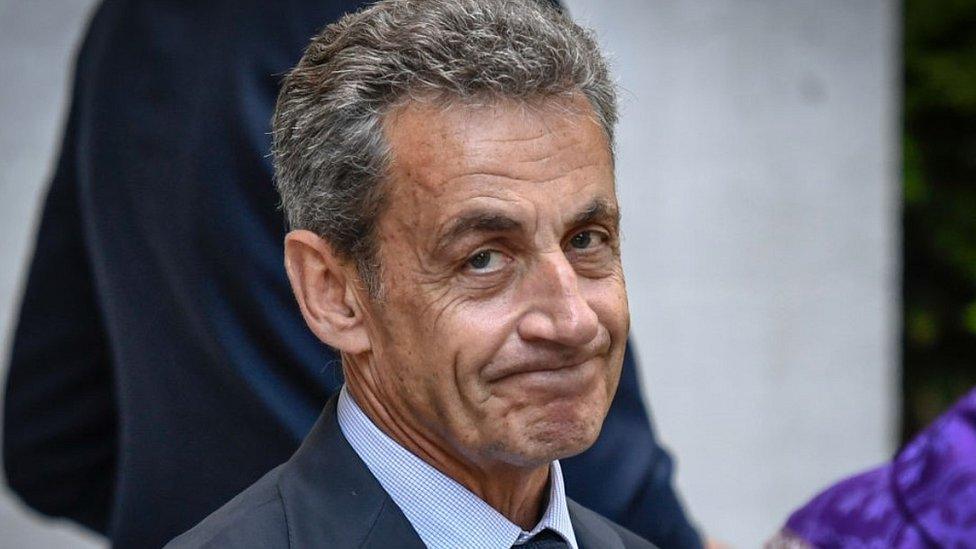Could Nicolas Sarkozy return to France's presidency?
- Published
Mr Sarkozy has made very few public appearances since stepping down last May
After a 30-year career in public life Nicolas Sarkozy left the Elysee Palace pledging "never to return".
But barely a year on the polls would suggest that if an election was held today, the former president would trounce the incumbent Francois Hollande and on the right, he remains the preferred candidate to stand in 2017.
Since May his appearances have been few and far between. These days, the ex-president sports a light designer stubble. Its a more relaxed, care-free image. Perhaps all part of the bigger plan.
"The game is to entertain the thought of a comeback," said Pierre Rousselin, commentator for the right wing newspaper Le Figaro. "He won't come back unless people ask for him to come back. And in French politics, the presidency is won over the heads of the parties - what really matters is the relationship between the candidate and the public opinion at large."
Asked about Mr Sarkozy's possible return the former interior minister Claude Guéant said: "When I see what's going on, when I look at what was achieved in his presidency, I think France should turn to him."
Of course the French have long indulged in nostalgia for their former presidents. The question is do they yearn for Mr Sarkozy - or his energy?
In 11 months in office, President Hollande has fallen further and faster than any other president of the modern day Fifth Republic.
A recent poll showed only 27% of the French have any confidence in him President Hollande.
"Don't forget Mr Sarkozy won almost half the popular vote when he lost the election," said Edouard Lecerf, of TNS Sofres.
"And suddenly - because Mr Hollande and his Prime Minister are so unpopular - people are looking back to a different period. More and more are wondering whether they made the right choice after all."
Mr Sarkozy's chances of stealing back the Elysee, albeit four years from now, will rest on the former president positioning himself as everything his successor Mr Hollande is not; in other words, a complete reversal of the last presidential campaign.
Mr Hollande, who cast himself as "Mr Normal" is now perceived as "too normal", struggling to get a grip an unprecedented economic crisis.
Suddenly Mr Sarkozy's irrepressible, roll-up-your-sleeves attitude, has taken on new allure.
Carla in tears
Of course with "Sarko" comes Carla, the former First Lady, who has now returned to song writing. There was crude speculation that once the Elysee was lost, the relationship would flounder. Not a bit of it.
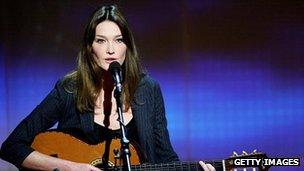
Carla Bruni has written a love song for her husband on her new album
On the new album is a love-song called Mon Raymond (Mon Nicolas was deemed inappropriate) but no mistaking who it's written for. A man so "sentimental and complex", she sings. And, "Whatever the fools might say... Raymond is dynamite".
But there is something more explosive than Mon Raymond, namely the case in Bordeaux which could yet derail Mr Sarkozy's hopes of a comeback.
Investigating magistrates have been doggedly pursuing allegations he took illegal party donations for his 2007 presidential campaign, from the 90-year-old L'Oreal Heiress Liliane Bettencourt.
This month he was placed under formal investigation, specifically for "taking financial advantage of a vulnerable woman". It was news that brought Carla to tears.
"It's simply unimaginable," she sobbed. "Simply unimaginable he could take advantage of a woman old enough to be his mother. I can't talk about it any more!"
Indeed so high are the stakes - a court case would put paid to any chance of a return - it has caused a furious slanging match between left and right.
The independence of investigating magistrate Jean Michel Gentil has been questioned - he even received a death threat; a bullet in the post.
'Poisonous rhetoric'
The row has brought a stern response from Christophe Régnard, president of the Union of Magistrates.
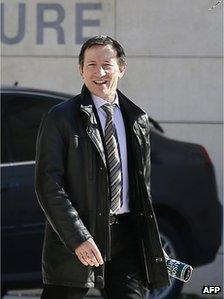
Magistrate Jean-Michel Gentil has received a death threat
"Politicians must be aware that in a democracy, justice and judges must be respected," he told the BBC. "Is it any wonder you get such violent uncontrollable reactions, to the kind of poisonous rhetoric we have heard."
Equally poisonous is the leadership battle on the right to replace Mr Sarkozy.
The wafer-thin victory of new leader Jean-François Copé was bitterly contested by the runner up, Francois Fillon, Mr Sarkozy's former prime Minister. And while Mr Copé remains nominally in charge - for now - the failed leadership contest leaves the door ajar for a challenge in the future.
"The problem for Mr Copé is that even though Mr Hollande is performing so poorly in the polls, his UMP party is not climbing in the polls!" said Le Figaro's Pierre Rousselin.
"And who else do you see on the right? There is a void. Sarkozy is there somewhere in the back of the minds of people, and he knows that. He is playing it very shrewdly, by not being there himself but having his people speak in his place."
The next election is still four years away - much can still happen. By then the economic cycle could be turning in Mr Hollande's favour.
But it's a mistake to write off Nicolas Sarkozy just yet. He is divisive - some still loathe him - but there are many more, like Carla, who continue to sing his praises.
- Published28 March 2013
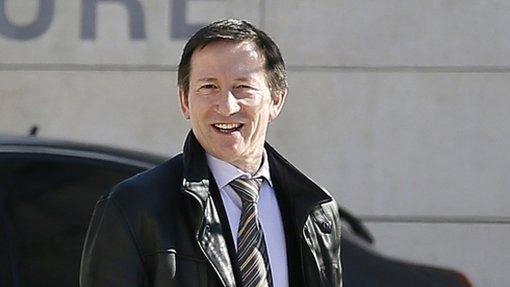
- Published21 March 2013
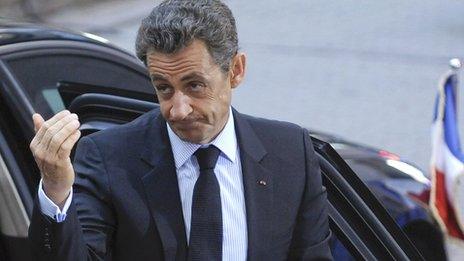
- Published8 January
